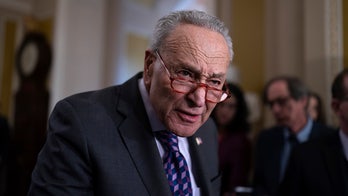It took President Obama three months to settle on a new Afghan war strategy, and the White House says that there were no losers in the review process -- that all of the president's advisers have partial ownership of the new plan.
But the plan Obama will announce Tuesday night -- sending 30,000 more troops and starting to wind down the war by 2011 -- is arguably closer to what Gen. Stanley McChrystal wanted than what Vice President Joe Biden argued for.
McChrystal, the top U.S. and NATO commander in Afghanistan, urged the president to send 40,000 troops to help turn the tide in the increasingly deadly and unpopular war, while Biden initially recommended turning the focus to counterterrorism by relying on Predator drones and pursing Al Qaeda in Pakistan.
In the end, Obama's decision is something of a compromise between hawkish advisers who were pressing him to heed the advice of his military commanders and political advisers like Biden who argued for scaling back the effort.
Obama is expected to make a nod to both sides Tuesday in his prime-time address from the U.S. Military Academy at West Point, N.Y. In announcing his new strategy for the eight-year-old conflict, he also will try to convince a war-weary public why the job in Afghanistan needs to be finished.
A new poll shows that 55 percent of Americans disapprove of Obama's handling of the war, while only 35 percent approve, a rating that is sharply down from September. And congressional Democrats are threatening a surtax on any troop surge, while liberal groups are planning to protest.
With that in mind, Obama will outline an accelerated timetable that will have the first Marines in Afghanistan as early as Christmas and all forces in place by summer. But he'll also reveal an exit strategy that will have the troops start leaving in 19 months.
The extended review process has opened the administration up to criticism on multiple fronts.
Biden's emphasis on counterterrorism has former Bush administration officials saying the vice president is more focused on getting out than winning.
"I think in some ways, the vice president's approach to Afghanistan has been equally focused to limiting our involvement rather than achieving the objectives that have us there in the first place," said Kori Schake, a research fellow at the Hoover Institution who served on the National Security Council in the Bush administration.
Administration officials say Biden's influence can be seen in the measured and conditional deployment of additional forces to Afghanistan and the benchmarks for Afghan President Hamid Karzai to achieve, both in training security forces and cleaning up corruption, which the president believes will push the Afghans to stand on their own.
Larry Korb, senior fellow for Center for American Progress and former assistant secretary of defense in the Reagan administration, agreed.
"I think by setting a goal, you put President Karzai on notice that he has to become a more legitimate ruler," he told Fox News. "You put the Afghans on notice that they're going to have to start taking control of their own destiny."
But some foreign policy analysts decried the influence that Obama's political advisers have had on the final Afghan strategy.
"The people around the president -- and this is part of the problem -- the ones who are closest to him are not national security, foreign policy people. They are political people," said former New York Times reporter Judith Miller, an adjunct fellow at the Manhattan Institute and Fox News analyst. She cited as examples White House Chief of Staff Rahm Emanuel and White House senior adviser David Axelrod.
But Miller added that Obama's compromise is a winner.
"Make no mistake about it. This is a win-win for the president in terms of a political message that leaves him invulnerable," she said. "The military gets the troops; the (political) base gets the rhetoric."
Steven Yates, a senior fellow for American Foreign Policy Council who served as deputy assistant to the former Vice President Dick Cheney for national security, said he believes Obama's political advisers have not been very helpful.
"There's clear evidence the national security team was fully on board with the strategy that was announced in March," he said, referring to Obama's decision to send an additional 22,000 troops. "And that was something fully briefed, debated, discussed and announced by no less than the president in defining what the mission was in the theater."
Yates said the only thing that changed since then was a bad political month for the Obama administration in August when the president realized he would need to rely on left wing of his party of push through his legislative agenda.
"And from September onward, it's been Axelrod, Emanuel, Gibbs and others going out making the case for what the problems are in this effort, the need for a time line, for withdrawals, that's really aimed at the domestic constituency, not the long term strategic objectives," he said.
Fox News' Wendell Goler contributed to this report.




